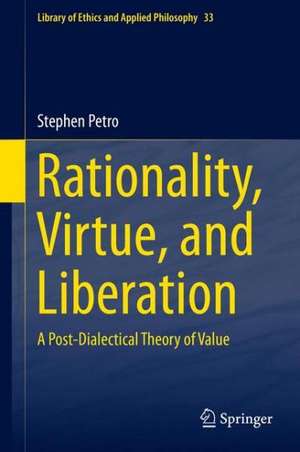Rationality, Virtue, and Liberation: A Post-Dialectical Theory of Value: Library of Ethics and Applied Philosophy, cartea 33
Autor Stephen Petroen Limba Engleză Hardback – 3 dec 2013
| Toate formatele și edițiile | Preț | Express |
|---|---|---|
| Paperback (1) | 642.68 lei 6-8 săpt. | |
| Springer International Publishing – 23 aug 2016 | 642.68 lei 6-8 săpt. | |
| Hardback (1) | 649.06 lei 6-8 săpt. | |
| Springer International Publishing – 3 dec 2013 | 649.06 lei 6-8 săpt. |
Din seria Library of Ethics and Applied Philosophy
-
 Preț: 429.22 lei
Preț: 429.22 lei -
 Preț: 389.70 lei
Preț: 389.70 lei -
 Preț: 184.53 lei
Preț: 184.53 lei - 15%
 Preț: 647.40 lei
Preț: 647.40 lei - 15%
 Preț: 641.71 lei
Preț: 641.71 lei - 18%
 Preț: 951.47 lei
Preț: 951.47 lei - 18%
 Preț: 952.89 lei
Preț: 952.89 lei - 15%
 Preț: 645.79 lei
Preț: 645.79 lei - 15%
 Preț: 637.13 lei
Preț: 637.13 lei - 15%
 Preț: 644.95 lei
Preț: 644.95 lei - 15%
 Preț: 645.47 lei
Preț: 645.47 lei - 18%
 Preț: 895.76 lei
Preț: 895.76 lei - 18%
 Preț: 959.67 lei
Preț: 959.67 lei - 15%
 Preț: 642.68 lei
Preț: 642.68 lei - 15%
 Preț: 642.51 lei
Preț: 642.51 lei - 15%
 Preț: 640.71 lei
Preț: 640.71 lei - 15%
 Preț: 642.68 lei
Preț: 642.68 lei - 15%
 Preț: 635.01 lei
Preț: 635.01 lei - 15%
 Preț: 638.43 lei
Preț: 638.43 lei - 24%
 Preț: 783.24 lei
Preț: 783.24 lei - 15%
 Preț: 634.18 lei
Preț: 634.18 lei - 15%
 Preț: 636.63 lei
Preț: 636.63 lei - 15%
 Preț: 638.57 lei
Preț: 638.57 lei - 15%
 Preț: 635.47 lei
Preț: 635.47 lei - 20%
 Preț: 565.64 lei
Preț: 565.64 lei - 15%
 Preț: 644.82 lei
Preț: 644.82 lei
Preț: 649.06 lei
Preț vechi: 763.60 lei
-15% Nou
Puncte Express: 974
Preț estimativ în valută:
124.19€ • 129.67$ • 102.79£
124.19€ • 129.67$ • 102.79£
Carte tipărită la comandă
Livrare economică 05-19 aprilie
Preluare comenzi: 021 569.72.76
Specificații
ISBN-13: 9783319022840
ISBN-10: 3319022849
Pagini: 350
Ilustrații: XIII, 327 p. 6 illus.
Dimensiuni: 155 x 235 x 25 mm
Greutate: 0.66 kg
Ediția:2014
Editura: Springer International Publishing
Colecția Springer
Seria Library of Ethics and Applied Philosophy
Locul publicării:Cham, Switzerland
ISBN-10: 3319022849
Pagini: 350
Ilustrații: XIII, 327 p. 6 illus.
Dimensiuni: 155 x 235 x 25 mm
Greutate: 0.66 kg
Ediția:2014
Editura: Springer International Publishing
Colecția Springer
Seria Library of Ethics and Applied Philosophy
Locul publicării:Cham, Switzerland
Public țintă
ResearchCuprins
Introduction.- Chapter I: Rethinking Rationality; 1.1 The Reconciliation of Ethical Rationalism, Ethical Naturalism, Virtue Ethics, and the Biological and Social Sciences; 1.2: The Failure of Axiological Anti-Foundationalism; 1.3: The Concept of Rationality: Toward a Universal Model.- Chapter II: Rationality and Dialectical Necessity; 2.1: Prescription, Preference, and Dialectical Contingence; 2.2: Developing a Method of Justification; 2.3: A Sound Positive Account, Part I: An Analysis of Gewirth's Ethical Rationalism; 2.4: A Sound Positive Account, Part II: An Analysis of Habermas's Discourse Ethics.- Chapter III: The Dialectical Structure of Value Judgments; 3.1: The Dialectical Structure of "Ought" and "Must"; 3.2: The Dialectical Structure of Rights and Duties.- Chapter IV: Rationality, Virtue, and the Search for Intrinsic Goodness; 4.1: Magnell's Challenge; 4.2: Problems in Searle's Epistemology of Function; 4.3: The Life Framework: The Significance of Foot's Virtue Theory Chapter V: Beyond Dialectical Necessity: Assertoric Necessity and the Grammar of Goodness; 5.1: Reflexive Intrinsicality & The Teleologically Comparative Tendential Necessity of Functions; 5.2: The Summum.- Bonum Conclusion.
Textul de pe ultima copertă
This book explores the overlooked but vital theoretical relationships between R. M. Hare, Alan Gewirth, and Jürgen Habermas. The author claims their accounts of value, while failing to address classic virtue-theoretical critiques, bear the seeds of a resolution to the ultimate question “What is most valuable?” These dialectical approaches, as claimed, justify a reinterpretation of value and value judgment according to the Carnapian conception of an empirical-linguistic framework or grammar. Through a further synthesis with the work of Philippa Foot and Thomas Magnell, the author shows that “value” would be literally meaningless without four fundamental phenomena which constitute such a framework: Logical Judgment, Conceptual Synthesis, Conceptual Abstraction, and Freedom. As part of the 'grammar of goodness,' the excellence of these phenomena, in a highly concrete way, constitute the essence of the greatest good, as this book explains.
Caracteristici
Analyzes the woefully overlooked philosophical interchange between Gewirth and Habermas on the vital issue of the dialectical method in ethics and value theory Provides a strong and controversial critique of anti-foundationalism so prevalent in contemporary value theory and philosophy Radically revises the concept of rationality and challenges conventional analytic and continental views alike
















